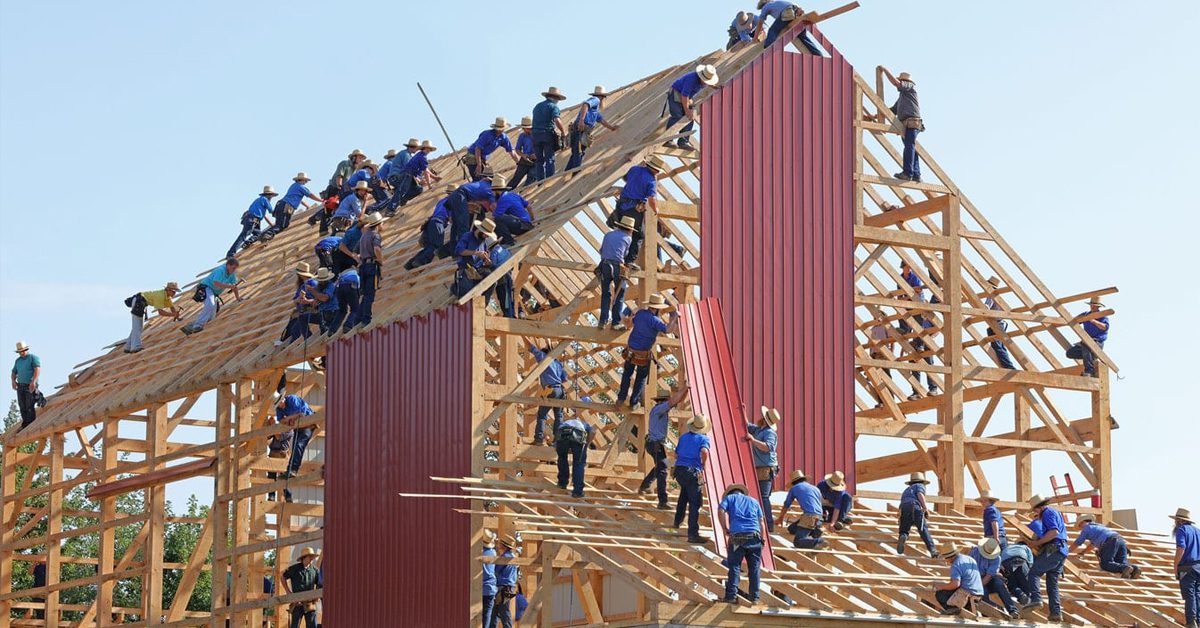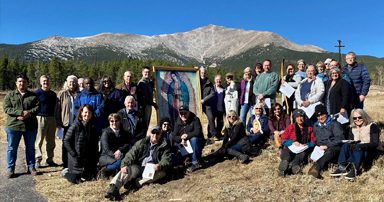I am working on a complex piece right now – and have been in the woods and mountains of central and eastern Oregon this last week where cell and internet signals have been a bit spotty. One fellow has been pushing me to repeat an article I did three years ago on preparation. I will do so below as it is both good in itself and sets up my more difficult article rather nicely.
I have been looking through books on foraging and frontier skills, trying to focus in on which are most concise and useful. I expect I’ll come up with a list of recommendations in about a month.
The last time I was able to check (early in the week) our summer fundraising drive for CORAC was starting to pick up a little steam. I know these are tough times, but CORAC is our insurance to weather the toughest of times. If you haven’t given yet, please make a donation so we can keep it all going. I’d give you a fist bump to try to get you to open the spigots, but that didn’t seem to work so well for Joe Biden in Saudi Arabia. (Actually, you could probably run an organization pretty well by always asking yourself, “What would Joe Biden do?” – and then doing the opposite.)
On another front, I am encountering more people of late who because of the massive dysfunction of the world, because of family problems, or because of mounting physical ailments are on the edge of or have given in to despair, thinking that God is finished with them. Don’t you do it! How dare you try to usurp God’s role as director of all this! As long as you are still taking in breath God is not finished with you and your work is not done. I know a man who has had several cancers, a few heart attacks, a stroke and a few other serious ailments. Thing is, his friends know he is enfeebled in many ways, but have no clue as to how many serious issues he has had to deal with – because he keeps doing the little he can, when he can, as best he can. And he assures me he will keep doing them until he can’t anymore – because he knows that it is God’s to decide when his work is done, not his. Onward Christian soldiers! Yours is to do your duty as best you can for as long as you can and as joyfully as you can. It is only God’s to decide when your work here is finished.
Without further ado, here is what I hope is the article my friend was asking to see again:

By Charlie Johnston
To accomplish superior achievement, it is not enough to simply defer to legitimate authority: you must actively work to make the strategy work, even when it is contrary to your own judgment. If you are a wide receiver on a football team, though you don’t call the plays, you are obligated to run crisp routes – whether you think it is the right play or not. If you run sloppily because you did not like the play call, you may have the satisfaction of bitterly complaining that if they would have just done what you said, you would have won – but you will never accomplish superior achievement nor achieve a spot where you become the play-caller. You will just be a mouthy loser. It is critical, in these times, to understand and internalize this.
On matters of great import, you reserve the right to candidly offer your assessment and recommendations privately. On routine matters simply do your best to make it work as the leader has directed. Serious people gravitate towards sound judgment, loyalty and fidelity. If you give consistently sound judgment and robustly work for the success of the group, whether or not a particular task is according to your judgment, people will seek out your counsel. Even more, the example you set of deference to legitimate authority will make it much easier to maintain discipline whenever you find yourself in authority. I would much rather work to make a mediocre plan a success than push even my most brilliant plan if it will divide the team. The former offers a much better chance of success. This, of course, does not include either unlawful or immoral orders. It applies to legitimate orders that are merely contrary to your own judgment.
I emphasize this because so much of modern life – and particularly modern discourse – has degenerated into a destructive and banal contest of wills. Even worse, people who thunderingly expound on what must be done are loathe to accept any responsibility if their course is adopted and fails. Many supposed decision-makers start working assiduously to deflect responsibility onto someone else should their plan falter immediately after the decision is taken – instead of working vigorously to make even their own plan work. Cowards and knaves, every one of them. When setting off on a course that made some vocally nervous, I often angrily told them to blame me if it failed, to which most eagerly assented. I certainly had my share of failures and blame – but the timid flunkeys who sought to avoid blame above all else never shared in the credit for my many successes, either.
Many – perhaps even most – of our most important mediating institutions are crumbling from the top down. The vandals have taken over media, academia and much of government. Shoot; media, academia and government bureaucracies have become training grounds for the vandals. They are the gasoline in the middle of a cultural fire. It is a fearful thing to behold. Yet even as the top collapses around us, even if the middle does not hold, the foundations of both our culture and our Church are strong. Perhaps it pleases God to allow this so he can re-build from the ground up.
I have written how important I think these next few months are in determining whether we can arrest this crumbling from the top – both in western culture and in the faith (once synonymous). If we just limp along through the fall, then next year will be extraordinarily ugly and perilous. So my thoughts turn to the health of the foundation and how to maintain it as the ramparts fall around us. Understand that when I speak of the foundation in the Church, I speak not just of laymen, but of all faithful laymen, religious and clerics. Leadership will probably have to come from laymen for a time. Some Bishops are timid, but all except the actual predators and those who assault Scripture and the Magisterium are to some extent held captive by corrupt actors – the vandals – at the top. The enemy is inside the gates and he has taken hostages. Even if laymen have to take the lead, they must play their position with fidelity. We cannot run the Church and should not try. Christ’s command on the matter is clear and compelling. Our mission here is to resist the predators and set the captive clerics free.
As we are in striking distance of real and substantial disruptions to normal life, even perhaps with communication, the time has come to discuss some plans for weathering a revolutionary assault on faith, family, freedom, and society.
The first thing to understand is that effective leadership and action here will be local. Jesus Christ is our man on a white horse – and the rest of us are merely His troops. It will take a lot of us, equally committed to faith, family and freedom, but acting independently with initiative and resolve.
One of the things that has been popular with readers in this community has been “storm dinners” – a combination prayer meeting and working dinner to collaborate on ways to coordinate with each other in case of crisis. If you have them in your area, keep it up and work to augment them. If you don’t, now is a good time to start. I will make arrangements to set up a sidebar here listing contact info for any regularly scheduled storm dinners. I understand that some will prefer to keep arrangements purely local and quiet.
Leaders of such groups should rise organically, someone local people trust and are willing to follow. Many of the characteristics of the type of leader local groups should look to can be found in St. Paul’s advice about effective Deacons in 1 Timothy 3:1-7. While Catholics, Orthodox, Protestants and faithful Jews may well make common cause in these efforts (and I have said repeatedly that all such are to be treated as full and equal partners in the work before us), leaders should be called from among those who clearly live their faith every day. Avoid two common errors. Do not try to make a good and holy man who is timid and lacks leadership skills into your leader. Such a man may well offer great counsel to the leadership team, but is rarely fit to rally people in crisis. Similarly, avoid men of action who think crisis relieves them of the duty to live both faith and worship. Do not send St. Therese of Lisieux to lead the battle nor sit St. Joan down in the cloister. The bulk of the battle is properly deploying people in ways that play to their strengths. Another trap to avoid is one who, taking leadership, does not recognize the legitimate faith of all, but tries to impose a triumphal enforcement of one faith tradition. You will have many common endeavors; make accommodations for authentic worship for all Judeo-Christian faith traditions involved. If we live the faith well in times of strife, who can doubt that God, Himself, will see to unity?
A common military axiom is that all battle plans go out the window as soon as the first shot is fired. Paradoxically, it is also axiomatic that the side that began with the best, most comprehensive battle plan, usually prevails. It is the process of developing plans, considering as many variables and options, that gives the prevailing side the advantage of both strength and flexibility in action. If all I accomplish by writing about areas that people should be thinking of is to trigger a new wave of restless and obsessive preparation, I will have failed. The single most important navigational star in all these things is the person of Christ. Typically, when confronted with an oncoming problem, I consider about a dozen possible scenarios and options on how to respond to each. A good 30 percent of the time, what actually happens was not among the scenarios I considered at all. Maybe 20-25 percent of the time it is the most likely scenario I thought of that comes to pass. It is the habit of mind, building strong, but supple mental muscles that is pivotal. People shy away from contemplating the potential for significant social dysfunction. My goal is to get you to contemplate these things in ways that will be useful if things go south, either abruptly or like a slow swirl down a drain. Do not make it your raison d’etre, but be prepared in coordination with your friends and family.
Think about how things rise from the ground up. The family is both the first Church and the first government. If it is healthy, the parents of the family exercise their authority out of love and devotion – and in service – to the members of the family. The children are obedient largely because they know their parents want their good. Voluntary associations rise from communities of families. Churches, civic associations, even barn-raisings are simply groups of neighbors collaborating with each other for the common good. They see a need and endeavor to meet it. Love, need, service, cooperation…these are the hallmarks of social structures organically growing from the ground up.
There are several things you should think of now while all is relatively calm. First, establish a rally point and a common message board where people can go and get information in the case of sudden crisis. Have at least some people in your group spend time learning pioneer-era and wilderness skills, such as soap-making, recognizing useful plants, and finding water when it does not come from the tap. Outdoor Life Magazine published a very handy and concise book, “The Ultimate Bushcraft Survival Manual.” I keep it with me wherever I go. Even if everything smoothes out and you never have to use it, having the knowledge and the skills to deal with whatever confronts you will tremendously boost your confidence and enable you to confront the unexpected calmly without panic. During my pilgrimage, I was right near the Buffalo Bayou at the far eastern end of central Houston when I realized that if everything suddenly collapsed, I would be fine. I knew how to get food, how to find shelter, how to follow water. It was a deep comfort. I think, with real satisfaction, that if I suddenly woke up in the middle of nowhere, I wouldn’t like it, but I would manage okay. When you can truly see such things as problems to be managed rather than raw terrors, you will navigate every problem with more facility and confidence – AND inspire confidence in those around you.
You will want to have at least one organizing center to build your community around. It can be a Church, a community center, or even a large home with some acreage to it. Mainly it is something that, instinctively, the people in your group will gravitate to in an emergency. It probably will be the site of your meetings or storm dinners before there is any real need for it as a crisis center. The more resources – both physical and spiritual – available there, the better. It is best if it is within easy walking distance of a source of water. Think in terms of the resources you would need if the grid was down and both communication and transportation was not easy.
The federal government actually had a site that provides some pretty good advice for preparedness for emergencies. (Note – the feds have ceased to allow ordinary Americans to access what was once a very good page on preparation. I left the link up so you could see what Trump gave you that Biden now denies you. Brandon’s government apparently does not want to help Americans deal with the problems Brandon creates – so there is a site – but you can’t access it anymore.) Please do not get obsessed with Hollywood disaster scenarios. They are exciting, but absurdly unrealistic. In most actual crises, whether of brief or extended duration, the overwhelming majority of people weather the crisis where they were when it began – and are at the same place when it ends. Many of the skills you develop and friends you make will be helpful whether the power is just out for a few days or if there is an extended period of strife.
Stay away from urban areas. If you live there, scout out a backup plan. It is in urban areas that people are least able and knowledgeable about how to endure crises and fend for themselves in an emergency. If the grid went down and supply chains were interrupted, every city in the country would be in deep crisis within a week. It is best that you avoid the raw panic there while having to establish basic means of living. Cities have become like great yachts that have no oars: if the engine is lost, they are stranded and at the mercy of others to rescue them. A humble rowboat is more useful. Much of the sophisticated elite have deluded themselves that they are driving the boat, when the reality is that they are mere passengers.
If any crisis is prolonged, your group will need a variety of skills available to function smoothly. Some of the skills you should put a premium on are:
- Builders, carpenters and people who are good with their hands
- Hunters and trappers, people who know how to acquire food from the land
- People who can properly prepare food in primitive conditions
- People who know how to cultivate food
- People who can sew, mend, and cure animal hides
- Teachers and catechists, along with people who can care for children
- Priests and pastors
In deeply dire circumstances, such as prolonged rioting, insurrection, or even civil war, you would need security for your little community. Try not to just rely on “tough guys,” but put a premium on police and ex-military to direct your security efforts. Training trumps toughness every time. The dirty little secret is that if we were serious about cleaning up our inner cities, police trained in marksmanship and SWAT tactics could clear out the most gang-infested areas in a week or two. We have ceased to be serious people in many ways.
Do not get overwhelmed with worry about things that may never happen. Just deal with what is right in front of you – in short, take the next right step. When I was on my pilgrimage, I did not worry about my ultimate destination. To concentrate on how far I would ultimately have to walk would have been terribly daunting. Rather, I focused on the 10-15 miles I would walk that day, securing food, water and shelter for the day. It was enough. “Therefore, do not be anxious for tomorrow, for tomorrow will be anxious for itself. Let the day’s own trouble be sufficient for the day.” (Matthew 6:34) Put enough good days together and you have a solid routine.
Do not be overly exclusive in who you allow to be part of your community. Insist, though, that all but the truly infirm contribute to as well as partake of the benefits of the community. Different people will have different capacities. Heaven knows, I am very limited in my capacity for physical labor any more. But I can cook, I can care for children and have some useful intellectual skills. There is no one size fits all. If someone wants to offend the community’s sensibilities – such as demanding that it deny its faith or permit the sort of pernicious nonsense that is the hallmark of modern times (gay marriage, micro-aggressions, etc) send them away to form their own community. You must not allow malicious takers to leech off what you produce together.
Above all, pray that the Lord gives you wisdom to see what is right, fortitude to do what is right, and humility to be grateful for His many benefits. The ramparts are crumbling and beginning to fall around us. I do not think they will hold. The Lord will build His Church back up from the foundation of faithful Priests, Religious and Laity – and in so doing will re-build our culture and society from the ground up. It is commonly known that Chicago’s late Cardinal Francis George said that he would die in his bed, his successor would die in prison and that the next successor would die a martyr in the public square. What I most value is his summation, which is far less frequently quoted: “His successor will pick up the shards of a ruined society and slowly help rebuild civilization, as the Church has done so often in human history.” Under God, we are called to be builders, and not just vandals.
Whether or not things get seriously contentious, each of us must call upon the Lord to rebuild our hearts from the ground up, to be the people He has called us to be.
(I developed this basic framework in collaboration with about a dozen people, most directly with Tom K of the TNRS team. I am deeply grateful for their counsel and guidance-CJ)

If communication goes out for any length of time, meet outside your local Church at 9 a.m. on Saturday mornings. Tell friends at Church now in case you can’t then. CORAC teams will be out looking for people to gather in and work with.
Find me on Gab at Charliej373 or at the CORAC group.
Find me on Twitter at @Charlie62394802




















0 Comments